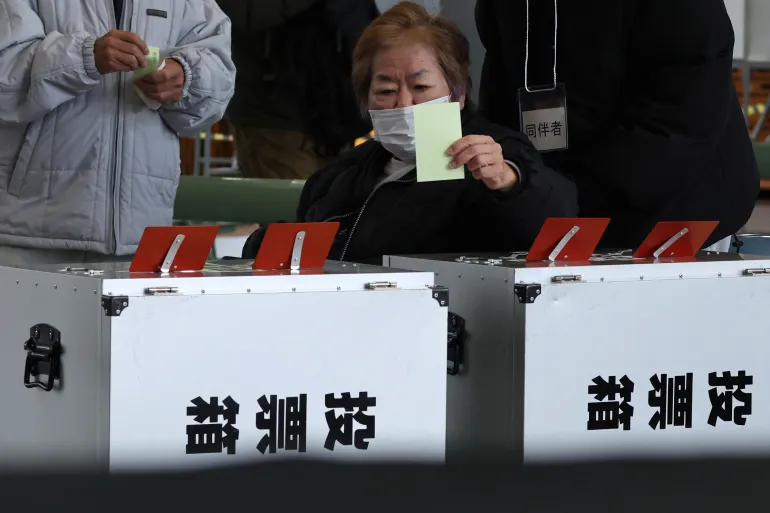PM Sanae Takaichi’s party set for majority in Japan parliamentary elections | News
Sanae Takaichi’s Liberal Democratic Party and coalition partner could secure as many as 366 of the 465 seats in the lower house, according to public broadcaster NHK.
Japanese Prime Minister Sanae Takaichi’s party is set to win 274 to 328 of the 465 seats in Japan’s lower house of parliament, well above the 233 needed for a majority, according to exit polls published by public broadcaster NHK.
Together with its coalition partner, the Japan Innovation Party, known as Ishin, Takaichi’s Liberal Democratic Party (LDP) could secure as many as 366 of the 465 seats in the more-powerful lower house in Sunday’s election, according to NHK.
Recommended Stories
list of 3 itemsend of list
“We have consistently stressed the importance of responsible and proactive fiscal policy,” Takaichi told reporters after media projections showed her party triumphing in the snap lower house election.
“We will prioritise the sustainability of fiscal policy. We will ensure necessary investments.”

While Takaichi is hugely popular, the ruling LDP, which has governed Japan for most of the last seven decades, has struggled due to funding and religious scandals. The PM called Sunday’s snap elections only after three months, in hopes of turning the party’s political fortunes.
However, Takaichi’s election promise to suspend the eight percent sales tax on food to help households cope with rising prices has spooked investors, who are concerned about how the nation with the heaviest debt burden among advanced economies will fund the plan.
Nevertheless, residents trudged through winter weather to cast their ballots with record snowfall in parts of the country snarling traffic and requiring some polling stations to close early.
“It feels like she’s creating a sense of direction – like the whole country pulling together and moving forward. That really resonates with me,” Kazushige Cho, 54, told Reuters news agency.
Meanwhile, Niigata resident Mineko Mori, 74, padding through the snow with her dog, said she worried that Takaichi’s tax cuts could saddle future generations with an even bigger burden.
‘She can push any legislation’
Craig Mark, a lecturer at Hosei University, says Takaichi’s apparent success in early election results likely gives the LDP the ability to “override the opposition parties”.
“Essentially, she can push through any legislation she wants, whether it’s the record budget that was recently approved or defence spending,” Mark told Al Jazeera from the capital Tokyo.
It is also the “greatest chance” for Takaichi to change the country’s image as a pacifist nation, he added. Japan’s post-World War II constitution does not officially recognise the military, and limits it to nominally self-defensive capabilities.
The head of Japan’s top business lobby, Keidanren, welcomed the result as restoring political stability.
“Japan’s economy is now at a critical juncture for achieving sustainable and strong growth,” Yoshinobu Tsutsui said.
China tensions
China will also be keeping a close eye on the results.
Weeks after taking office, Takaichi touched off the biggest dispute with China in over a decade by publicly outlining how Tokyo might respond to a Chinese attack on Taiwan.
A strong mandate could accelerate her plans to bolster military defence, which Beijing has cast as an attempt to revive Japan’s militaristic past.
“Beijing will not welcome Takaichi’s victory,” said David Boling, principal at the Asia Group, a firm that advises companies on geopolitical risk.
“China now faces the reality that she is firmly in place – and that its efforts to isolate her completely failed.”
